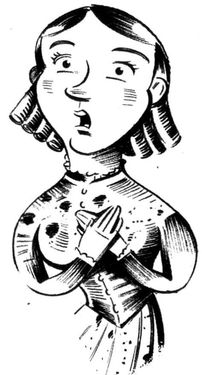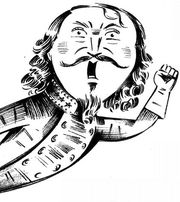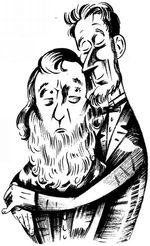Two Miserable Presidents (15 page)
Read Two Miserable Presidents Online
Authors: Steve Sheinkin

T
he fight for Little Round Top was just one part of an enormous battle being fought all over Gettysburg on July 2. For General Lee, it was a frustrating day of near misses. His army kept coming close to breaking through the Union army lines, but they just couldn't punch through. For the second day in a row, more than 10,000 soldiers were killed or wounded. And no one had won the battle of Gettysburg yet.
he fight for Little Round Top was just one part of an enormous battle being fought all over Gettysburg on July 2. For General Lee, it was a frustrating day of near misses. His army kept coming close to breaking through the Union army lines, but they just couldn't punch through. For the second day in a row, more than 10,000 soldiers were killed or wounded. And no one had won the battle of Gettysburg yet.
Tillie Pierce, the girl who had run home from school as the fighting began, watched wounded Union soldiers hobbling away from the battlefield.
“The first wounded soldier whom I met had his thumb tied up,” she remembered. “This I thought was dreadful, and told him so.”
“Oh, this is nothing,” he told Tillie. “You'll see worse than this before long.”
“Oh! I hope not,” she said.
Then the real wounded started coming. “Some limping,” Tillie wrote, “some with their heads and arms in bandages, some crawling, others carried on stretchers or brought in ambulances.” She went to work, carrying water to the wounded soldiers and tearing up clothing for bandages. And she was amazed at her ability to get used to the sight of operations and amputations and piles of arms and legsâsights she never could have imagined just a few days before.
A twenty-one-year-old teacher named Elizabeth Myers had a similar experience. She nearly fainted when she saw blood flowing from a young soldier's head. “I never could bear the sight of blood,” she said. But she decided to stay and helpâand she quickly adjusted to the horrible sights. “I was among wounded and dying men day and night,” she wrote.
“The soldiers called me brave, but I am afraid the truth was that I did not know enough to be afraid and if I had known enough, I had no time to think of the risk I ran, for my heart and hands were full.”
Elizabeth Myers

That night the commanders of both armies met with their top generals. General Lee decided to stay in Gettysburg and try one more attack. “There were never such men in an army before,” Lee said of his soldiers. “They will go anywhere and do anything, if properly led.”
Across the dark battlefield, General Meade also decided to stay and fight.
M
eanwhile, down in Mississippi, Grant still had Vicksburg surrounded. His plan was simple: let no food enter Vicksburg, and bomb the city night and day.
eanwhile, down in Mississippi, Grant still had Vicksburg surrounded. His plan was simple: let no food enter Vicksburg, and bomb the city night and day.
“We are utterly cut off from the world, surrounded by a circle of fire,” wrote Dora Miller in her diary. “The fiery shower of shells goes on day and night.” Miller was one of about three thousand residents trapped in Vicksburg. With bombs crashing through their homes, families scrambled to find new shelterâusually underground.
“Cave-digging has become a regular business,” said Miller,
“prices range from twenty to fifty dollars, according to the size of the cave. Two diggers worked at ours for a week and charged thirty dollars.”
“prices range from twenty to fifty dollars, according to the size of the cave. Two diggers worked at ours for a week and charged thirty dollars.”
Many of the caves were dug by enslaved men, who were stuck in town along with everyone else. Families that could afford large caves furnished their new homes with tables, rugs, mirrors, and mattresses. Not that this made life comfortable. “We were almost eaten up by mosquitoes,” remembered a young woman named Lida Lord. Then there were the snakes. “A large rattlesnake was found one morning under a mattress on which some of us slept that night,” she said.
Snakes were bad, but bombs were worse. Day after day, Mary Loughborough and her family heard shells exploding all around their underground home. “Terror stricken, we remained crouched in the cave,” she later wrote. One day a shell actually flew into the cave and crashed into the soft earth inside. The bomb's fuse was sparking and smoking and the family backed helplessly against the dirt walls. “We expected every moment the terrific explosion,” Loughborough wrote. Then George, a young slave, snapped into action. “Thus we remained for a moment, with our eyes fixed in terror on the missile of death, when George, the servant boy, rushed forward, seized the shell, and threw it into the street.”
“Very thankful was I for our preservation,” she said. How did she thank George for saving the family? She didn't say.
The siege of Vicksburg went on and onâtwenty days, then thirty, then forty. The food ran out and both soldiers and residents began to starve. Confederate chaplain William Foster described the changing look of soldiers, saying, “The cheeks became thin, the eyes hollow and the flesh began to disappear from the body and limbs.”
Hunks of horse and mule meat started showing up in the butcher shops. “Mother would not eat mule meat,” remembered a girl named
Lucy McCrae. “But we children ate some, and it tasted right good.” When the mules were gone, dogs and cats began disappearing from the streets of Vicksburg.
Lucy McCrae. “But we children ate some, and it tasted right good.” When the mules were gone, dogs and cats began disappearing from the streets of Vicksburg.
At the end of June, soldiers in Vicksburg wrote a letter to their commander. “If you can't feed us,” they wrote, “you had better surrender, horrible as the idea is.”
U
p in Gettysburg, Robert E. Lee stepped out of his tent a little after three in the morning on July 3. He was already dressed for battle. For the past two days he had been more impatient and restless then anyone had ever seen him.
p in Gettysburg, Robert E. Lee stepped out of his tent a little after three in the morning on July 3. He was already dressed for battle. For the past two days he had been more impatient and restless then anyone had ever seen him.
Lee found his “Old War Horse,” General James Longstreet, and told him the plan. They would launch 15,000 soldiers right at the center of the Union army line.
Longstreet didn't like it. “I have been a soldier all my life,” he said. “I think I can safely say there never was a body of fifteen thousand men who could make that attack successfully.”
But Lee's mind was made up. His army had come so far, fought so hardâall in search of one massive victory that would win the war. Now Lee saw that victory within reach, and he couldn't resist going for it. “The enemy is there,” he said, pointing across the battlefield, “and I am going to strike him.”
The sun climbed and the temperature soared into the nineties, with high humidity. One soldier from Tennessee called it “the hottest day I think I ever saw.”
It was about to get a lot hotter.
L
eading the center of Lee's attack was General George Pickettâwhich explains how this came to be known as “Pickett's Charge.” Pickett was known in the army as a fun-loving guy who put perfume on the curls at the end of his long black hair. But today he was deadly serious:
eading the center of Lee's attack was General George Pickettâwhich explains how this came to be known as “Pickett's Charge.” Pickett was known in the army as a fun-loving guy who put perfume on the curls at the end of his long black hair. But today he was deadly serious:
George Pickett

“Up, men, and to your posts! Don't forget today that you are from old Virginia!”
The men set out at a steady march across the mile-wide open field separating them from the Union army. “Advance slowly,” Confederate officers told their men. “No cheering, no firing.”
On the other side of the field, Union soldiers saw what looked like a walking forest of gray uniforms and guns and battle flagsâall moving right at them. “No man who looked on the scene can ever forget it,” the Union soldier Jesse Young said. It was terrifying, but it was also exciting. Union soldiers knew they had the advantage. They were on a low hill, lying behind stone walls and mounds of dirt. All they had to do was wait until the enemy was within range and then start blasting.
“Steady, boys,” Union officers cautioned. “Hold your position, don't fire until the word is given, keep cool, lie low till order is given to fire, make ready, take good aim.”
One Northern soldier realized he hadn't eaten anything all day. Then he decided he was glad, since his empty stomach allowed him to lie flatter on the ground.
“Come on, Johnny! Keep coming!” Union soldiers shouted.
They did keep comingâand then the Union rifles and cannons opened fire. “Arms, heads, blankets, guns, and knapsacks were tossed into the clear air,” a Union officer later said.
“At every step some poor fellow would fall, and his pitiful cry would come to my ear,” remembered John James, a Virginia soldier. And still the Confederate charge continued.
Some of the attackers fought their way up to the Union's stone walls, but they were quickly blasted back. The attack was shattered. More than half of the soldiers who set out on Pickett's Charge did not return. (Pickett survived, though he never forgave Lee for sending him on the doomed charge.)
General Lee watched survivors staggering back toward the Confederate lines. He rode back and forth, trying to encourage his men. “It's all my fault,” he told them. “All this has been my fault. It is I that have lost this fight, and you must help me out of it the best you can.”
Union soldiers, meanwhile, watched Lee's soldiers retreatâsomething they had not seen much of so far. This was a cause for celebration. “Some cried, others shook hands,” one Union soldier remembered, “and all joined in the best cheer we could get up.”
T
he next day, July 4, 1863, has to rank as the second most important Fourth of July in U.S. history. (July 4, 1776âthe day Congress approved the Declaration of Independenceâis still number one.) Two things made July 4, 1863, huge. First, General Lee faced the harsh truth that he had been beaten at Gettysburg, that his invasion of the North had failed. And, in a pounding rainstorm, Lee's battered army began the long retreat back to Virginia.
he next day, July 4, 1863, has to rank as the second most important Fourth of July in U.S. history. (July 4, 1776âthe day Congress approved the Declaration of Independenceâis still number one.) Two things made July 4, 1863, huge. First, General Lee faced the harsh truth that he had been beaten at Gettysburg, that his invasion of the North had failed. And, in a pounding rainstorm, Lee's battered army began the long retreat back to Virginia.
Second, after suffering through a forty-seven-day siege, the Confederate army at Vicksburg finally surrendered to General Grant. “We are now in the darkest hour of our political existence,” moaned Jefferson Davis. When Abraham Lincoln heard the news, he leaped from his chair and threw his long arm around the secretary of the navy, Gideon Welles, and shouted:
“I cannot, in words, tell you my joy over this result. It is great, Mr. Welles, it is great!”
Abraham Lincoln

The Confederates surrendered Port Hudson a few days later, giving the Union control of the entire Mississippi River. Now, for the first time, Lincoln believed the end of the war was in sight. “Peace does not appear so distant as it did,” he said. General Meade just had to chase down Lee's badly wounded army and capture itâand that would be the end of the Confederate States of America.
But when did things ever go right for Abraham Lincoln?
Other books
The Winner by David Baldacci
Research by Kerr, Philip
EcstasyEntwined by Ju Dimello
The Kissing List by Stephanie Reents
Slow Burn (Book 8): Grind by Adair, Bobby
Nowhere But Here (Thunder Road #1) by Katie McGarry
Destined to Kill: A Destined Novel (Destined Novels Book 1) by Jourdyn Kelly
Thrice upon a Time by James P. Hogan
Stranger on the Shore by Perry, Carol Duncan
